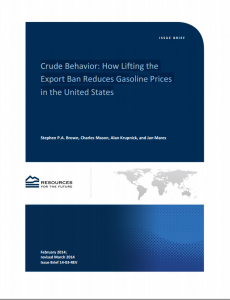Full Title: Crude Behavior: How Lifting the Export Ban Reduces Gasoline Prices in the United States
Author(s): Stephen P.A. Brown, Charles Mason, Alan Krupnick, and Jan Mares
Publisher(s): Resources for the Future
Publication Date: February 1, 2014
Full Text: Download Resource
Description (excerpt):
The ban on US crude oil exports began as a reaction to the oil embargo in the early 1970s and later was codified in law and Department of Commerce rules for granting export permits. Currently, crude oil can be exported to Canada, but only for use there, not for re-export; from Alaska if it comes through the TransAlaska pipeline or from Cook Inlet; if it is foreign oil; if it is in conjunction with operation of the Strategic Petroleum Reserve, and for a few other small exceptions. Refined products, however, can be exported without restriction.
Until recently, the possibility of exporting US crude oil was not an issue because the United States was importing so much oil from the rest of the world and forecasts of US oil production were showing a decline. All this changed with the “fracking” revolution (meaning a combination of hydraulic fracturing, horizontal drilling and seismic imaging technology), which quickly opened up vast resources of “tight” oil to exploitation—primarily in North Dakota (the Bakken play) and Texas (the Eagle Ford play and the Permian play)—and reduced US oil imports to new lows.
Combined with limited pipeline and rail transport capacity, this increase in oil production in the United States (see Chart 1) has led to bottlenecked oil supplies in the Midwest and a reduction in crude prices there. The situation has been exacerbated by the inability of most US refineries to efficiently process the light crude coming from these fields (particularly in refinery hubs along the Louisiana and Texas Gulf Coast, although Valero is an exception).
